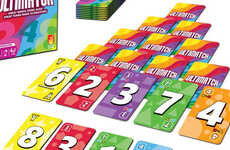
'Spaceteam' Challenges Players to Work Together to Save a Breaking Rocket
Laura McQuarrie — May 19, 2016 — Life-Stages
References: playspaceteam & technabob
'Spaceteam' is the name of a fun and fast-paced cooperative game by Henry Smith that gained popularity as a must-try party game app. Now, the game is being reintroduced to the public in the form of a card game with help from Timber & Bolt.
The premise of the game is simple: work with your team to save a spaceship that's quickly falling apart. There are color-coded cards that are used in gameplay that work as tools to repair parts of the ship, as well as Anomaly cards that allow players to switch seats and make adjustments to who select cards can be passed to.
A full game runs at the same pace of the included timer, which is just a mere five minutes. While the time restraint adds a challenge, it will be appealing to young consumers with short attention spans and ensures that everyone at a party gets a turn.
The premise of the game is simple: work with your team to save a spaceship that's quickly falling apart. There are color-coded cards that are used in gameplay that work as tools to repair parts of the ship, as well as Anomaly cards that allow players to switch seats and make adjustments to who select cards can be passed to.
A full game runs at the same pace of the included timer, which is just a mere five minutes. While the time restraint adds a challenge, it will be appealing to young consumers with short attention spans and ensures that everyone at a party gets a turn.
Trend Themes
1. Cooperative Party Games - Developing more party games that encourage cooperation rather than competition.
2. Adaptation of Popular Apps - Reimagining popular phone apps as physical games can create new and interactive experiences for consumers.
3. Color-coded Card Games - Creating simple but visually interesting card games that use color to communicate gameplay mechanics.
Industry Implications
1. Gaming - Integrating new modes of cooperative gameplay has the potential to draw in more consumers who prefer to play with others.
2. Toy and Game Manufacturing - Developing physical games that are easy to understand and have simple mechanics will help appeal to younger audiences and encourage them to play without feeling overwhelmed.
3. Mobile App Development - Exploring new ways of introducing app-based games to people who may not be as tech-savvy, or who prefer physical games over screen-based activities.
2.5
Score
Popularity
Activity
Freshness























